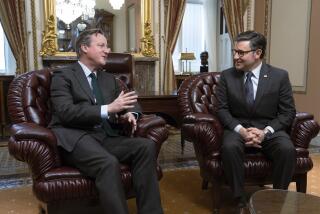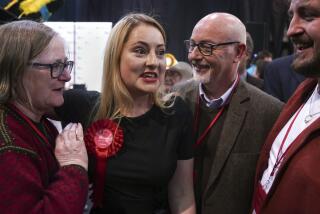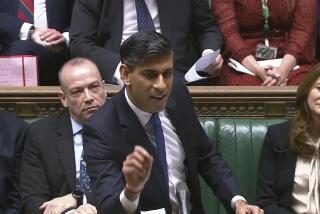David Cameron makes plea for Scotland to stay part of Britain
The date for a referendum hasn’t even been set. But Prime Minister David Cameron made an impassioned appeal directly to the Scottish people Thursday to keep Britain intact, imploring them to vote no on the question of whether Scotland should become an independent country.
“Of course Scotland could govern itself. So could England,” Cameron declared in Edinburgh, the Scottish capital. “My point is that we do it so much better together.”
In a dog-eat-dog world, he said, the Scots would be better off remaining joined to England, Wales and Northern Ireland under the shelter of collective British diplomatic, military and economic might.
“Whether in Edinburgh or London, the United Kingdom is a warm and stable home that billions elsewhere envy,” said Cameron, who described himself as a “unionist head, heart and soul.”
His speech, in the seat of Scottish political power, was the British government’s opening salvo in a campaign expected to culminate in a historic plebiscite probably sometime in 2014, when voters north of the border with England will decide whether to preserve the United Kingdom as it is or go their own way after three centuries of togetherness.
Cameron has no desire to go down in history as the prime minister who oversaw the breakup of Britain. As a sweetener to Scottish voters, he held out the possibility of granting more powers to Scotland to run its own affairs, but said that would be for later debate, after the question of statehood was settled.
He went to Edinburgh for talks with the leader of Scotland’s semiautonomous parliament, Alex Salmond, whose nationalist party has put the fight for independence front and center in Scottish politics. The two men, who have a prickly relationship, are negotiating the exact timing and wording of the historic referendum.
With most polls showing pro-independence sentiment hovering around 40%, short of a majority, Cameron is eager for the vote to take place as soon as possible.
But Salmond, considered by some the savviest politician in Britain, wants to hold the referendum in the second half of 2014, giving him and the Scottish National Party more time to make their case.
As a backup, he is also angling to put an alternative to full independence on the ballot, one that would greatly expand Scotland’s powers without secession. He criticized Cameron’s stand that that debate should be put off till after the plebiscite.
“If the prime minister has an offer to make to the people of Scotland, then he should make it now … so that we can have a clear debate and a clear decision on the alternative futures for Scotland,” Salmond told the BBC. “This idea of saying, well, vote no and we’ll give you something later, I don’t think is going to convince anyone in Scotland.”
At the same time, he has some convincing to do himself. Many of Salmond’s compatriots remain skeptical that they would be better off on their own rather than huddled under the British umbrella: for example, whether their economy would be able to compete strongly enough or whether Scotland by itself would be able to fund its social welfare policies.
For his part, Cameron tried to strike a cajoling tone, aware that to be seen as a lecturing or condescending Englishman would only undermine his case.
He paid tribute to Scotland’s proud traditions and achievements, its role in the Enlightenment and Britain’s industrial revolution. He mentioned Walter Scott, lauded Adam Smith and even quoted a line from a verse by Robert Burns, the iconic Scottish poet.
More Scots now live in England and more English live in Scotland than ever before, he noted, saying that together, Britons could advance the modern causes of freedom and inclusivity.
“Our union isn’t some antique imposition. It is living, it is free, it is adaptable. It is admired around the world as a source of prosperity, power and security,” Cameron said. “Together we have turned a group of offshore European islands into one of the most successful countries in the world.”
More to Read
Start your day right
Sign up for Essential California for news, features and recommendations from the L.A. Times and beyond in your inbox six days a week.
You may occasionally receive promotional content from the Los Angeles Times.







